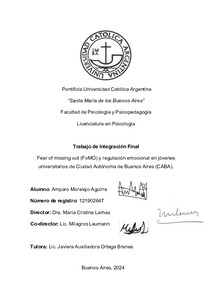Please use this identifier to cite or link to this item:
https://repositorio.uca.edu.ar/handle/123456789/18633| Título: | Fear of missing out (FoMO) y regulación emocional en jóvenes universitarios de Ciudad Autónoma de Buenos Aires (CABA) | Autor: | Moralejo Aguirre, Amparo | Otros colaboradores: | Leumann, Milagros Ortega Brenes, Javiera Auxiliadora |
Director de Tesis: | Lamas, María Cristina | Palabras clave: | JOVENES ADULTOS; ESTUDIANTES UNIVERSITARIOS; FEAR OF MISSING OUT; MIEDO A PERDERSE ALGO; REDES SOCIALES; REGULACION EMOCIONAL; DESREGULACION EMOCIONAL | Fecha de publicación: | 2024 | Resumen: | Las redes sociales generan el deseo de estar conectado y observar lo que
otros hacen, suponiendo que tienen experiencias gratificantes de las cuales no
se participa. El fenómeno denominado Fear of Missing Out, FoMO y la
preocupación que lo caracteriza, puede afectar el bienestar emocional, activar
emociones negativas y la desregulación emocional. El objetivo de este trabajo
fue estudiar la relación entre FoMO y la regulación emocional, RE en jóvenes
universitarios entre 18 y 25 años de CABA. El diseño fue no experimental,
cuantitativo de corte transversal y alcance correlacional. La técnica de muestreo
fue no probabilística y contó con la participación de 121 jóvenes universitarios.
Los instrumentos utilizados para la recolección de datos fueron; Escala de FoMO
FoMO-E, adaptación española y Escala de Dificultades en la Regulación
Emocional (DERS), adaptada a población local. Los resultados no mostraron
diferencias significativas en los niveles de FoMO según sexo y edad, pero si las
hubo en la RE según sexo y edad. Se identificaron también relaciones
significativas entre FoMO y las siguientes dimensiones de RE: falta de
aceptación emocional, claridad emocional, conducta dirigida a metas y dificultad
en control de impulsos. Los hallazgos sugieren que FoMO se asocia con algunas
dimensiones de la regulación emocional, lo que hace necesario mejorar la
gestión emocional en contextos en los cuales las redes sociales son prevalentes.
Se sugiere profundizar los mecanismos subyacentes de estas relaciones y en la
mejora de la regulación emocional en jóvenes expuestos a altos niveles de
FoMO Social networks generate the desire to stay connected and observe what others are doing, assuming they are having gratifying experiences that one is not participating in. The phenomenon known as Fear of Missing Out (FoMO) and the associated concern can affect emotional well-being, trigger negative emotions, and lead to emotional dysregulation. The objective of this study was to investigate the relationship between FoMO and emotional regulation (ER) in university students aged 18 to 25 in the City of Buenos Aires (CABA). The design was non experimental, quantitative, cross-sectional, and correlational in scope. The sampling technique was non-probabilistic and included 121 university students. The instruments used for data collection were the Spanish adaptation of the FoMO Scale (FoMO-E) and the Difficulties in Emotion Regulation Scale (DERS), adapted to the local population. The results showed no significant differences in FoMO levels by sex and age, but there were differences in ER by sex and age. Significant relationships were also identified between FoMO and the following dimensions of ER: lack of emotional acceptance, emotional clarity, goal-directed behavior, and difficulty in impulse control. The findings suggest that FoMO is associated with some dimensions of emotional regulation, highlighting the need to improve emotional management in contexts where social networks are prevalent. It is suggested to further explore the underlying mechanisms of these relationships and improve emotional regulation in young people exposed to high levels of FoMO. |
Cobertura Espacial: | Buenos Aires (Argentina : ciudad) | URI: | https://repositorio.uca.edu.ar/handle/123456789/18633 | Disciplina: | PSICOLOGIA | Derechos: | Atribución-NoComercial-CompartirIgual 4.0 Internacional | Fuente: | Tesis de Licenciatura. Pontificia Universidad Católica Argentina. Facultad de Psicología y Psicopedagogía, 2024 |
| Appears in Collections: | Licenciatura en Psicología |
Files in This Item:
| File | Description | Size | Format | |
|---|---|---|---|---|
| fomo-regulacion.pdf | 967,72 kB | Adobe PDF |  View/Open |
This item is licensed under a Creative Commons License

